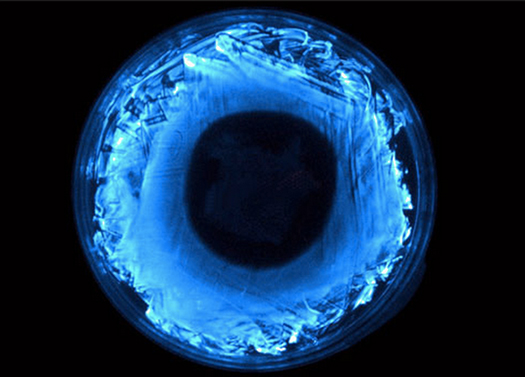


We’ve all basked in the glow of different light bulbs: incandescent, fluorescent, halogen, neon, LED, and more. But a lamp that harbors living, light-emitting bacteria — a biological bulb, if you will — is something radically different from what’s available on the market today.
Three undergraduate students from the University of Wisconsin, Madison, hope to change that with the help of crowdfunding.
The young scientists, who are finalists in the Popular Science #CrowdGrant Challenge, recently launched a crowdfunding campaign for a kit that anyone can use to make a Biobulb.
“The Biobulb is essentially a closed ecosystem in a jar,” says biochemistry major Michael Zaiken in the team’s video pitch. “It’s going to contain several different species of microorganisms, and each organism plays a role in the recycling of vital nutrients that each of the other microbes need to survive.”
The kit’s key ingredient will be a genetically engineered species of Escherichia coli bacteria. These microbes live inside the intestines of humans and other animals, and they don’t normally glow in the dark. But Zaiken and his two teammates, Alexandra Cohn (a genetics and philosophy double-major) and AnaElise Beckman (a neurobiology and anthropology double-major), plan to insert a loop of DNA into E. coli that will allow the bacteria to bioluminesce like jellyfish, fireflies, squid, or some other light-producing lifeform.
Electricity won’t power the bulb. The genetically modified E. coli plus a growth media, microbes that use ambient light to create food and recycle waste, and a bulb should be able to glow and recharge repeatedly, perhaps for days or months. (Sort of like a glowing version of those aquatic ecosystems sealed into glass spheres that you see in airline catalogs.)
Biobulb isn’t available yet; the team still needs to study the best genes, kit ingredients, and caretaking methods. One of the current challenges is finding a way to keep the DNA that codes for bioluminescence inside the E. coli as the cells replicate. “Right now we are looking at a couple of strategies to keep the [bioluminescence] genes stable over long periods of time,” Zaiken says on the Biobulb project’s RocketHub page.
More than delivering a cool product, Cohn hopes the crowdfunding project will cast a positive light on the field of synthetic biology. “Many people don’t understand what exactly synthetic biology is,” she says.
For more on the Rockethub-Popular Science #CrowdGrant Challenge, click here.
